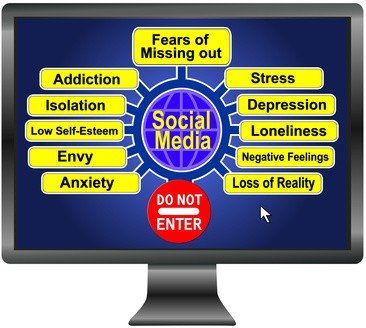 Social media stress is not unknown. We all get a little concerned about things we see on social networks. Several studies have shown a series of psychological issues that can arise from using social networks. These range from simple matters such as envy and fear of missing out, right through to stress-induced anxiety, even depression.
Social media stress is not unknown. We all get a little concerned about things we see on social networks. Several studies have shown a series of psychological issues that can arise from using social networks. These range from simple matters such as envy and fear of missing out, right through to stress-induced anxiety, even depression.
However, the negative feelings that you might get from a particular post could stay with you much longer than you think. You might believe that a negative item you looked at online this morning has gone from your mind when you are laughing at some TV comedy tonight.
It appears, though, that negative thoughts and feelings can linger in our subconscious, long after we have thought they have gone away. As explained in the article “The Long-Lasting Psychological Impact of Accidents“, adverse events in our lives can last for a very long time. This can often be a year or more after they initially happened, even when we think they have “gone” from our minds.
The chances are that if you saw something negative on a social network at the beginning of 2015, it could be lingering in your subconscious right now.
Social media stress and PTSD
Social media stress, caused by seeing something that affects us negatively, has been linked to Post-Traumatic Stress Disorder (PTSD). Research showed that when people watched a violent video, shared on social networks, they experienced symptoms of PTSD. These include flashbacks, with scenes from the video interrupting thoughts many months later. However, PTSD has other symptoms that can often be passed off as “minor”. These include irritability, difficulty concentrating and problems sleeping. If they are combined with flashbacks, more than a month after you have seen something disturbing online, then it is time for a trip to the doctor.
We often see disturbing things on the news. But they come with a “health warning” such as “you may find the following scenes upsetting”. That prepares us for the shock, and we can even look away or “tune out” of the information. Such warnings are not present on social networks. You can start reading something or watching a video that someone has shared only to find yourself negatively affected. The lack of “health warnings” on social media content could mean that there is a higher chance of PTSD from social networks than there is watching shocking scenes on TV news channels.
For business owners, it might be a good idea to provide such warnings if your content could upset people in any way. Remember, it might not upset them now, but it could be a year or more later that the effects start to show.
Perhaps it is time that all of us began to think about what we share online. The material we publish and recommend can have psychological impacts on the people who receive it.

1 thought on “Can social media cause post-traumatic stress?”
Yeah, i am agree with you. good luck with your blog.
Comments are closed.